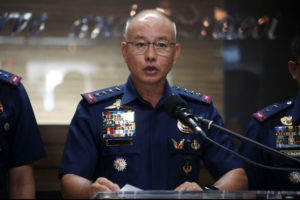News
Costume-clad security guards need permit: PNP

“They have to ask permission. It’s not absolute. All they must do is to ask permission from the SOSIA (Supervisory Office on Security and Investigation Agencies). The mall management must secure a permit if they want the guards to be in costumes to make them look friendlier.” (PNA file photo by Joey O. Razon)
MANILA — The Philippine National Police (PNP) on Monday reminded security agencies, malls and business establishments to seek permission first before ordering their guards to wear themed costumes.
“They have to ask permission. It’s not absolute. All they must do is to ask permission from the SOSIA (Supervisory Office on Security and Investigation Agencies). The mall management must secure a permit if they want the guards to be in costumes to make them look friendlier,” PNP Chief, Director General Oscar Albayalde told reporters during the press briefing after Monday’s flag ceremony.
Albayalde made the remark after SOSIA personnel sanctioned security guards in a mall in Makati City who were clad in Christmas costumes during an inspection.
He also emphasized that even policemen themselves are prohibited from wearing even a Santa Claus hat while conducting patrol or assigned in business districts and other public places without permission from the national headquarters.
Albayalde said the PNP strictly requires proper wearing of prescribed uniforms among security agencies and security guards across the country.
In the past, police officers have been wearing Santa Claus hats in malls and other public places, but this was stopped as the PNP leadership emphasized the proper wearing of police uniforms.
Under Section 14 of Republic Act 5487 or the Private Security Agency Law, the “Chief of the Philippine Constabulary (now the PNP), through his duly authorized representative, shall prescribe the uniform or ornaments, equipment and paraphernalia to be worn by the security guards and watchmen throughout the Philippines.”
The PNP-SOSIA regulates the operations of security agencies, including keeping in check all the security guards detailed at different establishments across the country.
Albayalde said one of the hazards of changing the uniform of a security officer is that criminals can use this to disguise themselves to be able to carry out their illegal activities.
He added that in case of emergencies, the response of security guards might be restricted or limited because they cannot be easily identified.





















